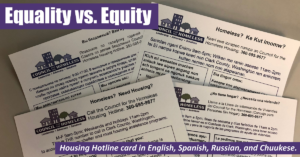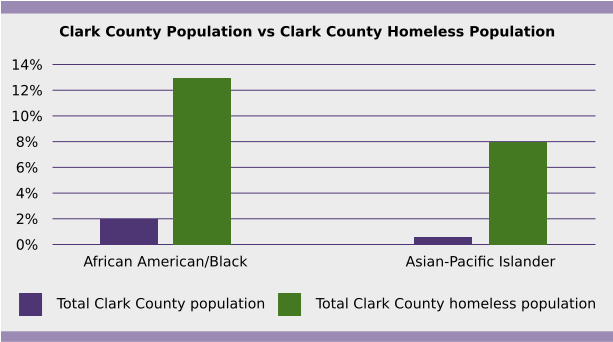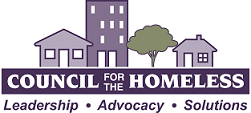By Charlene Welch, Council for the Homeless
 Most people believe in the concept of equal rights for all. Everyone deserves a “fair shake” or an equal chance to pursue opportunities in their lives. Equality and fairness mean everyone has the same access, tools, and community supports as everyone else. Everyone is treated the same and is therefore starting at the same place as they progress in their lives.
Most people believe in the concept of equal rights for all. Everyone deserves a “fair shake” or an equal chance to pursue opportunities in their lives. Equality and fairness mean everyone has the same access, tools, and community supports as everyone else. Everyone is treated the same and is therefore starting at the same place as they progress in their lives.
However, even with the best of intentions, the ideas behind equality and fairness often do not translate into the world of ending homelessness. This is where an “equity-based” approach comes in. Equity means providing people with the access, tools, and community supports they need to be stable in their housing.
According to a recent study by the Center for Social Innovation “People of color are dramatically more likely than White people to experience homelessness in the United States.” This is true in communities across the nation, including Clark County. According to the 2017 Clark County Needs Assessment, 2% of the total population is Black. However, based on our local Homeless Management Information System data, over 13% of those without a home in our community self-identify as Black. The same follows with people who self-identify as Asian-Pacific Islander. They represent 0.75% of the total Clark County population and 8% of the homeless population.

Many people trying to end their homelessness are starting from places shaped by institutionalized racism, generational poverty, and community systems that operate with practices that make the road harder for marginalized populations. At Council for the Homeless, we are working toward an equity-based approach when helping people end their homelessness. Advocacy at all levels is a key component of this work, including disrupting stereotypes, providing community education and seeking to improve access and integration of care. It also means working with landlords to ensure Fair Housing Laws are understood and helping people increase their support system by connecting them with mentorship opportunities, employment coaches, recovery based agencies and advocates.
Ongoing education and training for our team is also key. Staff are learning from and engaging with culturally specific community groups, increasing access points and translating documents and signage, and we are pursuing grant opportunities with like-minded foundations to support working with people of color from an equity based-approach. “We believe our work is not to simply create a level playing field for our clients,” shared Colt Taylor, CFTH housing coordinator. “Our role it is to meet them where they are – not where society tells them they should be – and help them identify and overcome their individual barriers to finding a home.”
As a community we need to seize opportunities to have open, honest dialogue regarding racism, homophobia, classism, sexism and other important issues in order to respond equitably to people in need. Building trust and addressing the needs of people of color and beyond will help us move toward making homelessness, rare, brief and one-time in Clark County.
If you would like to learn more about this topic, please see these related links:
National Coalition for the Homeless
Center for Social Innovation
Structural barriers reach deep into the lives of African American boys and men
